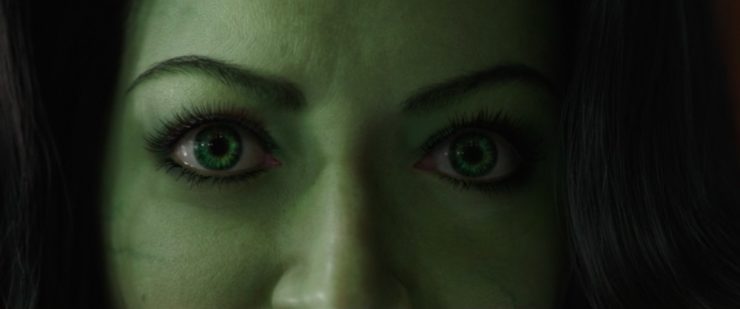Hello, and welcome to this meeting of the Tatiana Maslany Appreciation Society! I’ll be your host as we once again ponder a question that has troubled many a member in the wake of Orphan Black’s 2017 finale: Will this incredibly talented actor ever again get a role that’s worthy of her skills?
After the first episode of She-Hulk: Attorney at Law, the jury is still out. Maslany is great, but can a Marvel series keep up with her?
The episode title, “A Normal Amount of Rage,” nods at one of two themes She-Hulk seems most interested in: The fact that being a Hulk, a transformation that occurs due to anger and fear, is considerably different for a woman. The first episode is, somewhat disappointingly, all introduction (apparently it wasn’t always this way, but the origin story-loving Powers That Be won out). We meet Jennifer Walters, attorney at law, as she’s practicing a closing argument; a male colleague tries to tell her he’d do a better job, while her supportive paralegal friend Nikki (Ginger Gonzaga) says she’s got it. And if she doesn’t, she can always Hulk out.
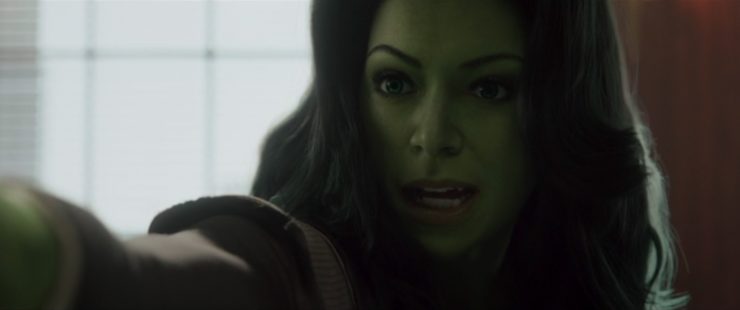
Cue our first fourth wall break! These come straight from the comics (which I will not be comparing the show to, as I haven’t yet read them). Jen ducks back into her office alone to chat straight to the camera, saying, “I’m guessing you’re not going to be able to focus on this fun lawyer show until you know all about that, so I’m gonna get you up to speed.”
In short: a few months ago, Jen and her cousin Bruce Banner (a guest-starring Mark Ruffalo) went on a road trip. When a spaceship appeared on the highway in front of them, they went off the road. Jen got out of the car and got Bruce out, but got some of his blood into her own injury, and thanks to some hand-wavey stuff about genetics and gamma radiation, she’s a Hulk now too. And her blood helped Bruce stabilize himself so he can be “Smart Hulk,” the integrated version of himself, all the time. Sadly, this means we only get Ruffalo’s real-life charming face for a few minutes before it’s all CGI, all the time.
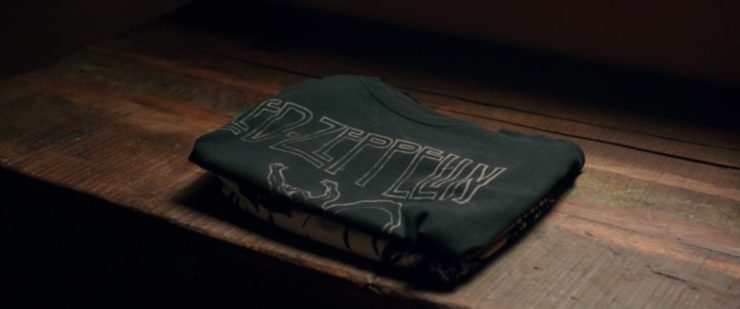
Maslany, on the other hand, changes back and forth. A lot. And she doesn’t need Bruce’s dialectical behavior therapy to manage it. He has a binder (a binder! A SYLLABUS!) for Hulk training, which is adorable and also raises a lot of questions about who he thought he was going to need it for (I don’t think he put that whole thing together while Jen slept). She can already maintain her own personality while she’s in Hulk form, and before long can transform at will.
About that transformation: I’m only going to complain about this once, but I have to get it out of my system. It’s patently absurd that Bruce turns into a giant super-muscled Hulk and Jen just … gets taller and her hair gets bigger. Her hair. Yes, the point here is “it’s different for a woman,” but it’s awfully convenient that “different” translates to “still hot, just intimidatingly tall.” She’s a little more buff, sure, but she’s still traditionally attractive. You bet it’s different for a woman. Women have to be hot even when they’re green monster superheroes.
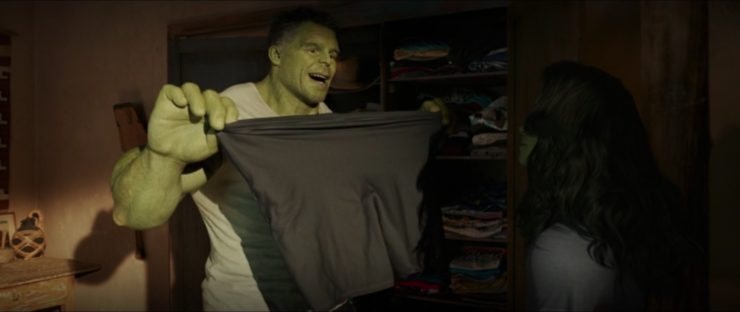
I wouldn’t put it past the show to eventually acknowledge this, though, which could be interesting. Writer Jessica Gao gets to one central point pretty quickly when Bruce is training Jen: He tells her the triggers for Hulking out are anger and fear, and she replies, “Those are like the baseline of any woman just existing.”
This is key to everything about Jen’s experience: She knows anger. She knows a daily amount of rage—a normal amount of rage!—and has spent her whole life regulating that. Bruce, having years of Hulkdom under his big spandex belt, assumes that his experience will be relevant to hers, but it’s not. It’s entirely different. He’s trying, and the show does a really graceful job of showing the sincerity and care of his attempts and how they frustrate and annoy Jen.
Buy the Book
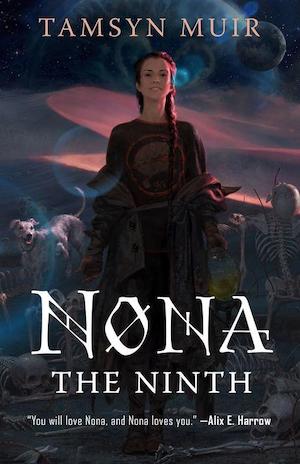

Nona the Ninth
That frustration and annoyance fuels Maslany’s whole performance, but it’s a balancing act, just like being a Hulk. Jen’s funny, she’s sharp, she’s impatient and sometimes a little mean because she’s mad and defensive, and she knows what she wants: her life and her career back. She didn’t consent to being a Hulk. Her resistance to Bruce’s efforts to tell her that she’s now a superhero is partly based in the fact that she doesn’t need anyone to tell her what or who she is. She’s a lawyer. She’s a grown-up, not a kid coming into surprising powers or one who’s obsessed over superheroes her whole young life. She’s kind of an oddball in Marvel-land, and Maslany plays her to perfection. And she nails this little speech:
“Here’s the thing, Bruce. I’m great at controlling my anger. I do it all the time. When I’m catcalled in the street. When incompetent men explain my own area of expertise to me. I do it pretty much every day because if I don’t, I will get called emotional, or difficult, or might just literally get murdered. So I’m an expert at controlling my anger because I do it infinitely more than you. So all of this just feels like projecting a lot of shit on to me.”
What remains to be seen is if the show builds on this concept, or just talks about it. This is almost all backstory! There’s tons of potential! And I’m very interested to see how this theme plays out over the next eight episodes.
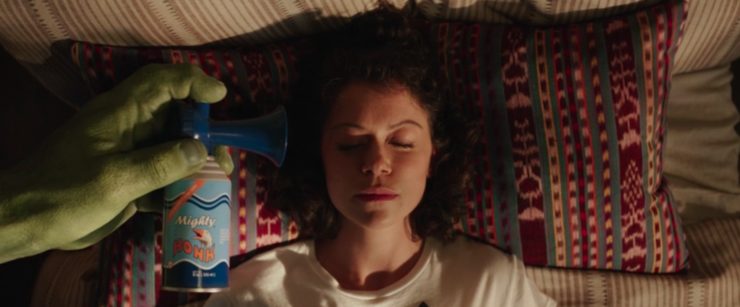
There’s another very clearly spelled-out theme, though, and it’s in the episode’s very first line: “What is the responsibility of those with power?” Jen is rehearsing her closing argument, but this question comes back again and again from Bruce, who keeps trying to tell his cousin that she has to be a superhero. His anxiety about this is palpable, even coming from a fully animated Ruffalo: The world needs protecting. Few know this better than he does. And if she won’t help, then who will? Whether she asked for this power or not, is it her responsibility to use it in service of the world? (You’re welcome to tell me what comic he’s apparently quoting.)
It’s a bit rough to know that much of this backstory originally fell later in the series, because this argument could have had more power later, when Jen’s spent more time denying her Hulk self. (As she says to Bruce, “Denying half of your being is no way to live.”) Having it come so early puts an emphasis on Bruce’s fears rather than Jen’s choices, which isn’t necessarily a bad thing. It’s just not what the show seems to really be about.
Of course they fight it out when she wants to leave. This is by far the least interesting part of the episode; the CGI is underwhelming, and there’s no real need to show them fighting except to underscore that Jen adapts to her powers incredibly quickly (which we could’ve seen by cutting back to the present, as happens at the end). Of course they destroy Bruce’s precious bar. Of course they have to rebuild it in order to rebuild their relationship. The fourth-wall break that comes in this sequence, though, is great: She turns to the camera for a brief aside, then turns back, looking baffled, like Who am I talking to? And Bruce looks, too, but doesn’t say anything.
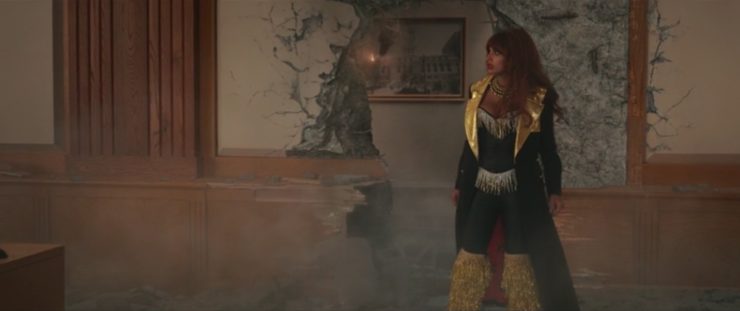
The courtroom scene at the end reminds us this is a lawyer show, and also very briefly introduces Jameela Jamil’s Titania—well, she barges in and breaks stuff, anyway, but doesn’t so much as say her name. It’s primarily a chance for Jen to Hulk out in public, to show the world her secret (and to show us that Nikki pays attention; love the moment with the shoes). Now her story can really start.
FLAMING HOT CHEETO CRUMBS
- Who doesn’t love a shout-out to one of the greatest pictures of Oscar Isaac? Jen eats her Cheetos with chopsticks. Bruce learns this magnificent technique. They toast! With Cheetos! I hope Oscar Isaac is very proud.
- That spaceship, Bruce says, was a Sakaaran class A courier craft, probably trying to deliver a message. I’m sure that message has nothing to do with whatever B-plot they’ll use to tie She-Hulk into Marvel’s master plans.
- The way Bruce so clearly misses Tony, and Tony is so present in this beach house (where Bruce spent the Blip working on himself!!!!) is a lovely through-line to everything he’s been through. And “To a good time during a hard time” is a really good toast.
- A training montage that I didn’t even talk about??!? I generally love a training montage, but apart from Jen’s perfect attitude, this one was fairly unremarkable.
- The mid-credits scene is perfect. The drunk fake-out! Her glee! According to head writer Jessica Gao, the answer to Jen’s pressing question is “straight from Kevin [Feige]’s golden mouth”: Captain America fucks.
Molly Templeton lives and writes in Oregon, and spends as much time as possible in the woods. Sometimes she talks about books on Twitter.










